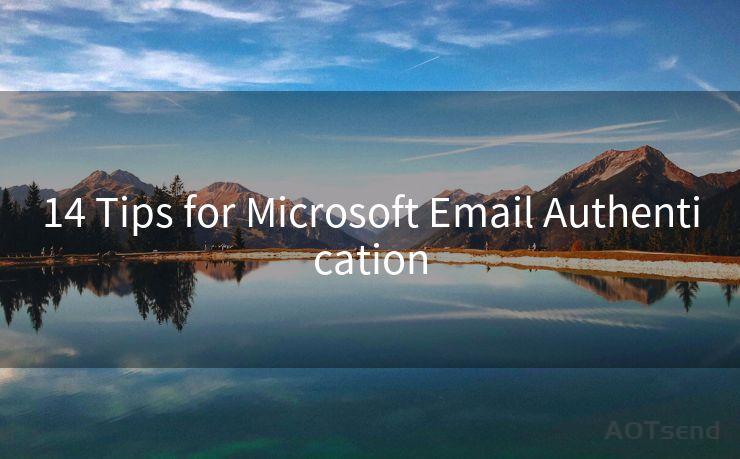14 Tips for Microsoft Email Authentication




Email authentication is crucial in today's digital landscape, where phishing attacks and email spoofing are common threats. Microsoft, being one of the leading email service providers, offers several tools and methods to ensure email authenticity. In this article, we'll explore 14 tips for Microsoft email authentication that can help enhance your email security.
🔔🔔🔔
【AOTsend Email API】:AOTsend is a Managed Email Service for sending transactional emails. Support Email Types: reminders, authentication, confirmations, notifications, verification codes, invoices, password resets, account activations, billing statements, two-factor authentication (2FA), and one-time passwords (OTP) emails, etc. $0.28 per 1000 Emails. 99% Delivery, 98% Inbox Rate.
You might be interested in:
Why did we start the AOTsend project, Brand Story?
What is a Managed Email API, How it Works?
Best 25+ Email Marketing Platforms (Authority,Keywords&Traffic Comparison)
Best 24+ Email Marketing Service (Price, Pros&Cons Comparison)
Email APIs vs SMTP: How they Works, Any Difference?
1. Enable DKIM Signing
DKIM (DomainKeys Identified Mail) is an email authentication technique that allows the receiver to verify that an email was indeed sent and authorized by the owner of a specific domain. Enabling DKIM signing for your Microsoft email domain adds a layer of trust and security to your outgoing emails.
2. Utilize SPF Records
Sender Policy Framework (SPF) records help receivers verify the authenticity of emails by specifying which servers are authorized to send emails from a particular domain. Configuring SPF records correctly is essential to prevent email spoofing.
3. Implement DMARC Policy
DMARC (Domain-based Message Authentication, Reporting, and Conformance) builds upon SPF and DKIM to provide a framework for email receivers to handle unauthenticated emails. By implementing a DMARC policy, you can specify how receivers should treat emails that fail authentication.
4. Use Multi-Factor Authentication
Enhance the security of your Microsoft email account by enabling multi-factor authentication. This adds an additional layer of verification, such as a code sent to your phone, making it harder for unauthorized access.
5. Regularly Update Your Password
It's essential to regularly update your Microsoft email account password to reduce the risk of it being compromised. Choose a strong and unique password each time.
6. Beware of Phishing Attacks
Phishing attacks often imitate legitimate emails from Microsoft or other trusted sources. Always verify the sender's email address and never click on suspicious links or attachments.
7. Utilize the Microsoft Authenticator App
The Microsoft Authenticator app provides an additional level of security for your account. It generates time-based one-time passwords (TOTP) for two-step verification, making it harder for attackers to gain access.
8. Monitor Your Account Activity
Regularly monitor your Microsoft email account activity to identify any suspicious or unauthorized access attempts. Microsoft provides tools and notifications to help you stay vigilant.

9. Configure Secure Protocols
Ensure that your email client or server is configured to use secure protocols like TLS (Transport Layer Security) for encrypted communication. This helps protect your emails from being intercepted during transmission.
10. Avoid Using Public Computers or Networks
Accessing your Microsoft email account from public computers or unsecured networks increases the risk of account compromise. Use your own trusted devices and secure networks whenever possible.
11. Be Cautious of Forwarding Rules
Be careful when setting up email forwarding rules, as they can be exploited by attackers. Regularly review and update your forwarding settings to ensure they align with your current needs.
12. Utilize Microsoft's Advanced Threat Protection
Microsoft's Advanced Threat Protection offers additional security features like safe links and safe attachments, which can help protect you from malicious content in emails.
13. Backup Your Emails Regularly
Regularly backing up your emails ensures that you don't lose important data in case of any security incident or accidental deletion.
14. Stay Updated on Security Patches and Updates
Keep your Microsoft email client and operating system up to date with the latest security patches and updates. This helps protect against newly discovered vulnerabilities.
By following these 14 tips for Microsoft email authentication, you can significantly enhance the security of your email communications. Remember, email security is an ongoing process, and it's essential to stay vigilant and proactive in protecting your account.




Scan the QR code to access on your mobile device.
Copyright notice: This article is published by AotSend. Reproduction requires attribution.
Article Link:https://www.mailwot.com/p1778.html



